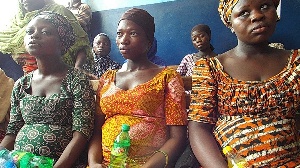 Salifu Saa-ed said gov't is committed to fight against child marriages
Salifu Saa-ed said gov't is committed to fight against child marriages
The Government of Ghana is committed to the fight against forced child marriages and other forms of sexual and domestic violence especially in parts of the Northern Region where such practices are very prevalent, Northern Regional Minister Salifu Saa-ed has said.
According to him, the government was committed to gender issues and had increased women’s participation in governance. “I know the first lady is so committed to this course. We as a government is committed to ensuring that the SDGs on attaining international acknowledgment of the power of women is attained by 2030”.
The minister said this in a speech read for him by the Sagnarigu District Chief Executive Mrs. Mariam Iddrisu at the opening of the 2017 Girls’ Camp organized by Songtaba in Tamale in the Northern Region.
According to UNICEF, in Ghana, one in every five girls is in marriage or in an informal union or cohabitation arrangement. In Northern Ghana, it is 1 in every 3 of girls. The incidence of child marriage in the area is attributed to negative cultural practices, religious beliefs, poverty, peer pressure, illiteracy and parental irresponsibility.
Under the theme: “Supporting Girls To Learn, Lead, Decide and Thrive; The Responsibility of All”, the girls’ camp sought to empower young girls from basic schools with vital information that would enable them to contribute significantly towards the fight against child marriage and sexual violence.
The girls’ camp was also organized as part of the implementation of the Girls Advocacy Alliance project being implemented in 30 communities in Saboba, Gusheigu and Sagnarigu Districts by Songtaba and Plan International Ghana.
Implemented over a 5-year period (2016-2020), the project seeks to achieve equal rights and opportunities for girls and young women.
The Executive Director of Songtaba, Hajia Lamnatu Adam, explained that the project centres on some five thematic areas; child marriage, sexual violence and abuse, commercial sexual exploitation of children and child sex tourism as well as access to Technical, Vocational Education Training (TVET) and decent employment opportunities for girls and young women.
By the end of the 5 year implementation period, she estimated that the project would have reduced child marriage and sexual abuse of girls and young women significantly in the beneficiary districts.
Moreover, girls and young women, she said “would have increased access to TVET and to decent work opportunities”.
“The project has reached out to about 750 girls from July 2016 to date. We must all support to build solid structures at the community level such as the community child protection teams to protect our vulnerable girls from abuse. Protection is less expensive than dealing with the consequences of the abuse” Hajia Lamnatu stressed.
The Northern Regional Minister stated that, the Free Senior High School policy of the government would complement the efforts by civil society organisations in promoting access to quality education for girls who need to be in school and not married off.
Going to school, he observed, gave girls choices and opportunities in life, allowing them to play an active role in their communities and break the cycle of poverty. “Girls who are married are unlikely to be in school. Education is essential for girls to be able to make informed decisions about their sexual health and well-being…”, the Minister noted.